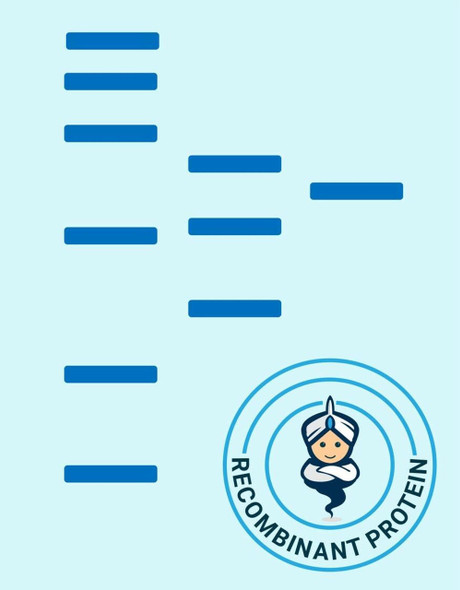Human TPM4 Recombinant Protein (RPPB4992)
- SKU:
- RPPB4992
- Product Type:
- Recombinant Protein
- Species:
- Human
- Uniprot:
- P67936
Description
| Product Name: | Human TPM4 Recombinant Protein |
| Product Code: | RPPB4992 |
| Size: | 10µg |
| Species: | Human |
| Target: | TPM4 |
| Synonyms: | Tropomyosin alpha-4 chain, TM30p1, Tropomyosin-4, TPM4. |
| Source: | Escherichia Coli |
| Physical Appearance: | Sterile Filtered colorless solution. |
| Formulation: | The TPM4 solution (1 mg/ml) contains 20mM Tris-HCl buffer (pH 8.0), 10% glycerol, 2mM DTT and 0.1M NaCl. |
| Stability: | Store at 4°C if entire vial will be used within 2-4 weeks. Store, frozen at -20°C for longer periods of time. For long term storage it is recommended to add a carrier protein (0.1% HSA or BSA).Avoid multiple freeze-thaw cycles. |
| Purity: | Greater than 85.0% as determined by SDS-PAGE. |
| Amino Acid Sequence: | MGSSHHHHHH SSGLVPRGSH MAGLNSLEAV KRKIQALQQQ ADEAEDRAQG LQRELDGERE RREKAEGDVA ALNRRIQLVE EELDRAQERL ATALQKLEEA EKAADESERG MKVIENRAMK DEEKMEIQEM QLKEAKHIAE EADRKYEEVA RKLVILEGEL ERAEERAEVS ELKCGDLEEE LKNVTNNLKS LEAASEKYSE KEDKYEEEIK LLSDKLKEAE TRAEFAERTV AKLEKTIDDL EEKLAQAKEE NVGLHQTLDQ TLNELNCI |
TPM4 is a member of the tropomyosin family. Tropomyosins exist in practically all eukaryotic cells (both muscle and nonmuscle), where they bind actin filaments and function to modulate actin-myosin interaction and stabilize actin filament structure. TPM4 binds to actin filaments in muscle and nonmuscle cells and plays a central role, in connection with the troponin complex, in the calcium dependent regulation of vertebrate striated muscle contraction.
TPM4 produced in E.Coli is a single, non-glycosylated polypeptide chain containing 268 amino acids (1-248 a.a.) and having a molecular mass of 30.7kDa.TPM4 is fused to a 20 amino acid His-tag at N-terminus & purified by proprietary chromatographic techniques.
| UniProt Protein Function: | TPM4: a cytoskeletal protein that binds to actin filaments in muscle and nonmuscle cells. Plays a central role, in association with the troponin complex, in the calcium dependent regulation of vertebrate striated muscle contraction. Smooth muscle contraction is regulated by interaction with caldesmon. In nonmuscle cells is implicated in stabilizing cytoskeleton actin filaments and endocytosis. |
| UniProt Protein Details: | Protein type:Motility/polarity/chemotaxis Chromosomal Location of Human Ortholog: 19p13.1 Cellular Component: cytoskeleton; cytosol; focal adhesion; membrane; muscle thin filament tropomyosin; stress fiber Molecular Function:protein binding; structural constituent of muscle Biological Process: cell motility; muscle contraction; muscle filament sliding; osteoblast differentiation |
| NCBI Summary: | This gene encodes a member of the tropomyosin family of actin-binding proteins involved in the contractile system of striated and smooth muscles and the cytoskeleton of non-muscle cells. Tropomyosins are dimers of coiled-coil proteins that polymerize end-to-end along the major groove in most actin filaments. They provide stability to the filaments and regulate access of other actin-binding proteins. In muscle cells, they regulate muscle contraction by controlling the binding of myosin heads to the actin filament. Multiple transcript variants encoding different isoforms have been found for this gene. [provided by RefSeq, Nov 2009] |
| UniProt Code: | P67936 |
| NCBI GenInfo Identifier: | 54039751 |
| NCBI Gene ID: | 7171 |
| NCBI Accession: | P67936.3 |
| UniProt Secondary Accession: | P67936,P07226, Q15659, Q5U0D9, Q9BU85, Q9H8Q3, Q9UCS1 Q9UCS2, Q9UCS3, Q9UCS4, |
| UniProt Related Accession: | P67936 |
| Molecular Weight: | 32,723 Da |
| NCBI Full Name: | Tropomyosin alpha-4 chain |
| NCBI Synonym Full Names: | tropomyosin 4 |
| NCBI Official Symbol: | TPM4�� |
| NCBI Official Synonym Symbols: | HEL-S-108�� |
| NCBI Protein Information: | tropomyosin alpha-4 chain |
| UniProt Protein Name: | Tropomyosin alpha-4 chain |
| UniProt Synonym Protein Names: | TM30p1; Tropomyosin-4 |
| Protein Family: | Tropomyosin |
| UniProt Gene Name: | TPM4�� |
| UniProt Entry Name: | TPM4_HUMAN |










